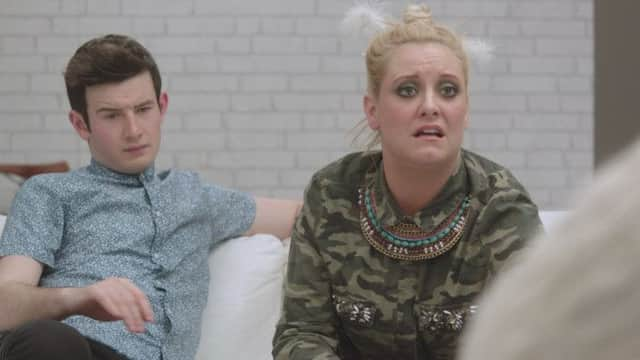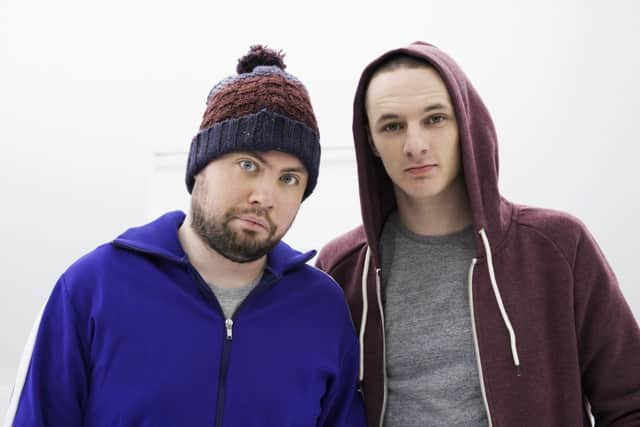Will Sketchland give Scots writers comic relief?


THIS time last year, Calum Nelson hadn’t written a comedy sketch in his life. Today he’s on the verge of receiving his second television credit.
One of several young writers recruited as part of BBC Scotland’s drive to promote emerging talent, Nelson is understandably dazed and delighted by this rapid chain of events in his career.
Advertisement
Hide Ad“At first it was really surreal seeing lines I’d written in my living room at four in the morning being performed on the telly,” he says, “but they bring it to life really well.”


The life-bringers in question are a similarly untried team of young Scottish comic actors who made their television debut last September in the one-off topical comedy special, What’s Funny About The Indyref? They’ve now reunited for Sketchland, a jam-packed, rapid-fire comedy pilot based around the trials and tribulations of leaving home for the first time.
If all goes to plan, BBC Scotland could be in the process of nurturing a new generation of writers and performers to follow in the wake of the venerable Naked Video, Absolutely and Chewin’ The Fat. No pressure then.
One of two experienced script editors tasked with shepherding these eager unknowns, Jon Hunter is aware that such opportunities don’t come along every day. “BBC Scotland have been great recently, there’s been a proper comedy push with amazing things like Limmy’s Show,” he says. “As a new sketch writer you don’t get to write for TV anywhere else. There are Radio 4 things, but I can’t remember the last time there was a telly show specifically for new writers.”
Hunter, whose credits include Have I Got News For You and Mock The Week, has been involved with the project since it was commissioned six months ago. “The idea of the show is we’re looking at one topic from lots of different angles with lots of different voices,” he explains. “Our job was to try and make sure that the writers weren’t clashing and overlapping with each other. When you’re asked to write sketches on a particular topic, a lot of people’s first thoughts are going to be along the same lines. So we encouraged them to look into areas more personal to themselves.”
Nelson, who is one of 15 writers credited on Sketchland, concurs with Hunter’s approach to the project.
Advertisement
Hide Ad“It was decided that leaving home would be a good theme because it’s quite broad,” he says. “There’s a lot of opportunities to cover a whole load of different topics. But it also ties together quite well, and obviously, because it’s young people writing and acting in it, it’s relevant to them. It has that thing of feeling quite personal but also giving scope to a whole load of different voices to be heard in the programme.”
How did he find the experience of working with seasoned comedy professionals such as Hunter and his Mock The Week cohort Gareth Gwynn?
Advertisement
Hide Ad“When they give you positive feedback on something you’ve done, that’s obviously great because these are guys who’ve seen a lot of comedy in their time,” he says. “Sometimes when you see some of the tweaks they’ve made to the dialogue, you think, ‘Oh, why did I not think of that?’ It’s really great the way they’ve taken all these different ideas and sketches and put them together in a tight package.”
Though pleased with the end result, Hunter explains that bringing new writers and performers together for the first time isn’t without its drawbacks. “You’ve got untried writers who don’t really know the cast, so it’s not like they’re thinking, ‘That actor is really good at doing this sort of character, I’ll write for them.’ They don’t know what these actors are good at. A series would be much easier to write, because then they’d know their strengths.”
In the event of Sketchland being picked up for a full series, Hunter reckons the loosely themed format is flexible enough for further development. “My thought is that you’d have a vague umbrella topic – employment, say – that could be looked at from 25 different angles, so you’re not treading water. It’s nice to give people a vague theme to work from, especially when you’re a new writer.”
So what would be his key piece of advice for budding comedy scribes? “New writers often try too hard to write sketches,” he says. “They forget what their original funny idea was. So what we do is try and help them stick with what they knew was funny in the first place, and get that idea out in the best way.”
Nelson agrees that brevity is often the soul of wit. “One of the things the script editors have been great for is recognising how long a sketch needs to be. You might submit something that lasts two minutes, and they realise they can cut it down to 30 seconds and make it a lot punchier and funnier.”
Despite being focused on young talent, Hunter is adamant that viewers of all ages can relate to the anxious themes of the Sketchland pilot. “Leaving home is one of the things that everyone has gone through,” he says. “Also, for some older people their kids may have recently moved out so they’ll have been through the same thing from the other side. That feeling of being somewhere different or having to look after yourself is recognisable from whether you’ve just been promoted at work or you’ve got new neighbours moving in. Suddenly you’ve got a new chance to establish who you are.”
Advertisement
Hide AdAs for the future of sketch shows, Hunter feels that BBC Scotland’s push towards relatively low-budget projects such as Sketchland is a wise move.
“Big, silly sketch shows are obviously expensive to make,” he says. “If you’re making a sitcom you build your coffee shop set and film a whole series there, whereas with a sketch show you build a set and then move on. But what Sketchland has shown is you can have a funny sketch with minimal props and sets, but still give it a good sense of place and character. Limmy doesn’t have massively expensive sets, sometimes it’s just him in a bedroom talking to a camera, but still it’s a really funny sketch. The important part isn’t what’s in the background.” n
• Sketchland, BBC2, Friday, 10pm